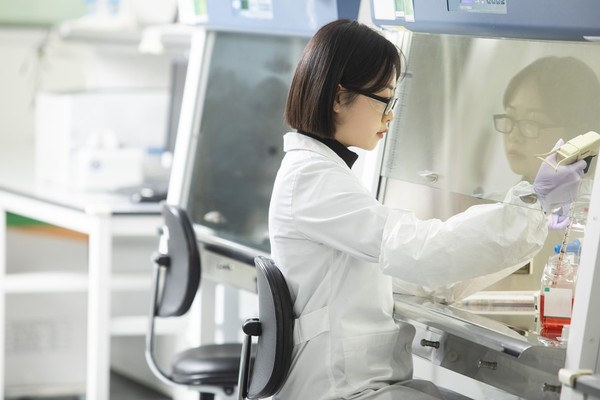For Korean pharmaceutical and biotech companies, biosimilars used to be the new source of income. Especially after Celltrion and Samsung Bioepis successfully released biosimilars in the global market, many local pharmaceutical and biopharma firms have jumped into developing biosimilars.
Chong Kun Dang, Dong-A ST, LG Chem, Ateogene, Prestige Biopharma, Sam Chun Dang Pharm, and Huons Lab are new developers of biosimilars. Taking one step further, Ildong Pharmaceutical aims to develop biobetters.

According to a 2021 report by the Korea International Trade Association’s research institute on changes in the global pharmaceutical supply chain, the global biopharmaceutical market has grown 8.6 percent annually from 2012 to 2019. The report said that in the next six years, from 2020 to 2026, the market will grow 10.1 percent per year.
The report predicted the biosimilar market would expand rapidly because many patents of original biopharmaceutical products expired after 2020. The blockbuster drug Humira (adalimumab) will have its patent expire in the U.S. in 2023.
The report said the biosimilar market was proliferating because countries began to encourage the use of relatively cheap biosimilars to reduce healthcare costs and improve patients’ access to drugs.
The report noted that a company that catches the timing of a global blockbuster drug’s patent expiration and releases a biosimilar swiftly would grab an opportunity to secure a part of the existing new drug’s market share.
A biosimilar’s successful market entry is Celltrion’s Remsima (infliximab), a biosimilar referencing Remicade of Janssen. Five years after entering the European market in September 2013, Remsima’s prescriptions surpassed those of the original drug Remicade. Remsima was the first Korean drug to record over 1 trillion won annual prescription sales.
Celltrion and Samsung Bioepis have steadily rolled out biosimilar products entering Europe and the U.S.
Biosimilar makers frustrated with the original drug’s price cut
However, some experts offer a rather depressive outlook for biosimilar developers.
The competition among biosimilars has become fierce, and original drug developers are taking a defense strategy. A Humira biosimilar’s entry into the U.S. is expected in 2023, which will be the most significant event for biosimilar makers. However, observers said the Humira biosimilar market in the U.S. has already become a red ocean.
“When Humira’s patent in Europe expired, the original drug maker AbbVie lowered its price by nearly 80 percent to retain the product’s market share,” said a local industry official with expertise in drug development. “From then on, it has become almost a formula for original drug makers to cut the price of the original drug radically when a biosimilar penetrates the market.”
He added that this strategy could frustrate a biosimilar developer who must have spent so much time and cost.
Leading biosimilar makers like Celltrion and Samsung Bioepis raised such concerns several times.
At a healthcare forum in April, Yang Eun-young, former vice president and head of the global sales team at Samsung Biologics (currently the chief business officer at CHA Biotech), said multinational pharmaceutical firms such as Roche, AbbVie, and Merck could cut the price of original drugs quickly because they already returned profits from those products.
Celltrion to use ‘solid supply chain,’ Samsung Bioepis, ‘advanced manufacturing’
Biosimilar manufacturers know that they cannot survive the biosimilar market if they focus only on offering a low price.
Samsung Bioepis and Celltrion said they would use their unique advantages to survive the brutal competition.
Celltrion Group emphasized that it had a solid global supply chain. While Roche’s breast cancer drug Herceptin (trastuzumab) suffered an extreme supply shortage in Thailand and Australia, Celltrion’s biosimilar has never been in short supply, the group said.
“Recently, there have been several out-of-stock issues regarding biosimilars,” an official at Celltrion Healthcare said. “When we talk with government officials in Europe, they pay special attention to the supply chain. In bidding, they give extra points to companies without any supply issue.”
Celltrion and Celltrion Healthcare have never had a supply problem in providing biopharma products in more than 120 countries because the company has manufacturing facilities, the official said. “This will give us an advantageous edge in the U.S. market.”
Samsung Bioepis emphasized that its biosimilars offered “consistent product quality.”
Roche’s Herceptin had problems such as “draft” in antibody-dependent cell-mediated cytotoxicity (ADCC) and FcγRⅢ activity. Still, the company said that Samsung Bioepis’ biosimilar minimized the risk of those problems.
“Biopharmaceutical products could face quality changes in batches, so-called draft. So, a biosimilar manufacturer should strictly manage the production process to make sure such changes do not affect the safety and efficacy of the drug,” Samsung Bioepis said.
The company added that it used state-of-the-art technology to analyze the original drug and established a strict quality control system through systematic drug development and manufacturing procedures.
The company said it was aware that merely competing with price makes it almost impossible to survive in the biosimilar market.
An official at a biotech company also said that biosimilars should become not just “a cheap drug” but “a drug made with advanced technology that is cheaper than the existing medicine.”

